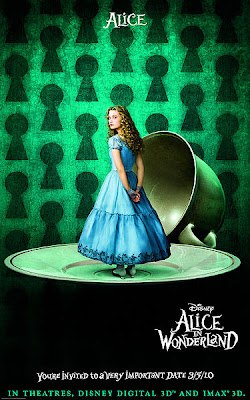 So, here is another Comic-Con story that maybe I should have posted earlier, but (1) I think this merits its own post, and (2) I just thought of posting about. Disney released the trailer for Tim Burton's upcoming live-action/stop-motion/motion-capture version of Alice In Wonderland, and I am very excited (I would have embedded the trailer, but Disney disabled that feature).
So, here is another Comic-Con story that maybe I should have posted earlier, but (1) I think this merits its own post, and (2) I just thought of posting about. Disney released the trailer for Tim Burton's upcoming live-action/stop-motion/motion-capture version of Alice In Wonderland, and I am very excited (I would have embedded the trailer, but Disney disabled that feature).
As with all Burton movies (I should do something about Edward Scissorhands sometime), the film looks like it will be very beautiful, so at least we'll have that, even if the movie itself is not so good. There are some things about the film that would trouble me had it been any other director, most notably making the Mad Hatter look like a kooky clown and making Alice an adult (in many versions, Alice is played by a teenager, but she is still meant to be a prepubescent girl).

There are a few things in the trailer that I want to comment on. First, I am happy, but not excited, to see Mia Wasikowska as Alice; she was the only thing I liked about the movie Defiance mainly because she is nice to look at. She showed some ability to act, but that movie was so poorly written that not even Daniel Craig could make his lines convincing (I apologize for breaking my "no hating" rule). There are plenty of other actresses I wouldn't mind seeing in the role (I've read that Amanda Seyfried auditioned, and I think she would be a good adult Alice), but I want to see if Wasikowska can act or not.
 Second, it looks like the Mad Hatter's role in the story is going to be increased considerably; Johnny Depp gets the one on-screen credit during the trailer, and he seems to be doing things in addition to holding his mad tea party. Finally, I'm a little surprised that Burton is having Alice shrink out of her clothing in the door chamber at the entrance to Wonderland. I'm going to try and avoid the, um, "mature" (or should that be "immature"?) areas of my mind, but to me, having her shrink out of her clothes is the beginnings of a much more adults-only version of the movie. Obviously, this is a Disney movie, and in all subsequent scenes in the trailer, she is still wearing clothing, so I am wondering how Burton is going to play that scene.
Second, it looks like the Mad Hatter's role in the story is going to be increased considerably; Johnny Depp gets the one on-screen credit during the trailer, and he seems to be doing things in addition to holding his mad tea party. Finally, I'm a little surprised that Burton is having Alice shrink out of her clothing in the door chamber at the entrance to Wonderland. I'm going to try and avoid the, um, "mature" (or should that be "immature"?) areas of my mind, but to me, having her shrink out of her clothes is the beginnings of a much more adults-only version of the movie. Obviously, this is a Disney movie, and in all subsequent scenes in the trailer, she is still wearing clothing, so I am wondering how Burton is going to play that scene.
The one last nitpick I have right now has to do with something that has been done in nearly every adaptation of Alice I've ever seen. In the book version of Alice's Adventures in Wonderland, part of Wonderland was represented as a deck of cards, and those scenes featured the Queen, King, and Knave of Hearts. In Through the Looking Glass, and What Alice Found There, the entire book was structured like a game of chess, and that book featured the Red and White Queens. In most adaptations, the Queen of Hearts and the Red Queen are combined for whatever reason, leading to a character who has aspects of playing card suits and chess queen attributes, and this adaptation looks to be no different. Helena Bonham Carter has hearts all over her costume, yet she is opposed to her sister and rival, the white queen.

I hope this adaptation will be good. He has done some good kids films (Nightmare Before Christmas... well, he produced that, Henry Selick directed it) and some less than good ones (Charlie and the Chocolate Factory), and when he has done movies that are not his own works, he has done some very well (Sweeney Todd) and some just ok (Chocolate Factory again). I wish that Disney wasn't the distributor so that he could go as dark and crazy as he wanted, but I have faith that he can still effectively show us his vision under the confines of the Disney name.
Up next: A Jedi shall not know fear nor anger nor love...



























